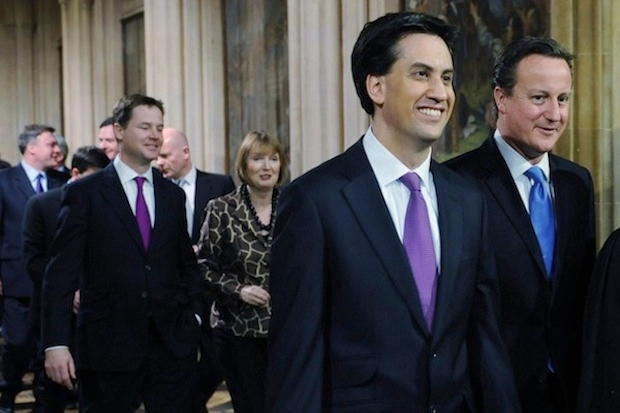Labour is on course to win the next general election, according to Lord Ashcroft. In two polls — one of 26 Tory-Labour marginal constituencies and another national poll carried out after election day — the former Tory treasurer says there is currently a 6.5 per cent swing to Labour. That’s enough for 83 Conservative MPs to disappear and for Ed Miliband to have a working majority. Both polls highlight the significant challenge David Cameron faces to remain Prime Minister next year. Here are five things you need to know about Ashcroft’s latest polling.
1. According to the marginal polls, Labour will have a working majority
In Ashcroft’s top 26 marginal constituencies (he is keen to point out Conservative HQ may have different seats in mind), there is a ten point lead over the Conservatives for Labour. This would give Labour a majority in the House of Commons of around 70 seats, enough to govern effectively. Based on voting intentions for a general election tomorrow, Ukip are now on 20 per cent.
2. Not all Conservatives want a Tory majority government
Most surprisingly, Ashcroft’s polling suggests that 20 per cent of Conservative voters do not want to see a Tory majority government after the next election. Although most of the voters are still overwhelmingly in favour of a majority, it seems one in five Tories have been won over by the concept of coalition.
3. Half of Ukip voters are disenchanted Tories
Just over half of those who voted Ukip at the Euro elections this week voted Conservative at the last general election. But in next year’s election, Ashcroft’s findings suggest half of these folks will go back to the Conservative party. The others mostly haven’t made up their minds yet. Two thirds of Ukippers also think David Cameron is the best person to be Prime Minister.
4. Ed Balls’ constituents trust George Osborne on the economy
In the marginal constituencies, Ashcroft reports voters are generally more optimistic (than pessimistic) about the economic outlook for the next 12 months. Outside of London, people were less optimistic than in the capital — but there was one notable exception. The people of Morley and Outwood were more optimistic on the economic outlook than the other marginals. Their MP, is one Ed Balls.
5. Half of the electorate hasn’t decided how it will vote in 2015
Although many of the findings here are consistent with the polling trends we’ve seen recently, it’s worth remembering half of those said they haven’t decided how they will vote in the next general election yet. Generally, voters become firmer in their views and voting intentions six months before an election. Although the electoral landscape looks pretty hopeless for the Tories right now, things could be different later in the year.






Comments